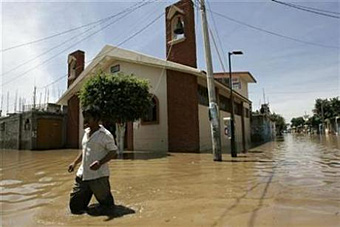
|  |  |  Americas & Beyond Americas & Beyond  
Storms Damage Budgets in Central America, Mexico
 Patrick Rucker & Mica Rosenberg - Reuters Patrick Rucker & Mica Rosenberg - Reuters
go to original
November 13, 2010


| | A man walks through a flooded street in Oaxaca September 29, 2010. (Reuters/Jorge Luis Plata) |  |
Mexico City - Heavy rains and storms this year have left Mexico and Central America with hundreds of millions of dollars in repair bills, a trend officials expect to be a perennial strain on budgets as climate change sets in.

The unusually fierce hurricane season, which brought 19 major storms through the region, left local governments scrambling to find the money to rebuild roads, bridges and homes, forcing them to rethink tax cuts or seek outside aid.

Climate change models show the situation will only get worse as temperatures rise, taking a real toll on budgets across Latin America. Development banks and ratings agencies alike have urged the region to brace itself for severe weather and the resulting heavy repair costs.

"This is our new life with climate change," said Gabino Cue, the incoming governor of Mexico's southern state of Oaxaca, which bore the brunt of heavy rains this season.

Oaxaca, one of Mexico's poorest states, could face a $163-million (2-billion-peso) tab to repair roads, bridges and other public works damaged by extreme weather this year.

"The government has to redraw the risk map with this phenomenon," Cue said.

The budget impact of climate change will be on the agenda this month when officials gather in Cancun to try and craft a replacement for the Kyoto Protocol, the global treaty on curbing greenhouse gases that expires at the end of 2012.

Global leaders are not expected to sign a comprehensive deal and in any case, there is no short-term outlook for a turnaround in the extreme effects of climate change.

As a result, local policymakers are left contemplating the budget impact of more storm seasons like this one, the most active in five years.

TORRENTIAL RAIN

Weeks of heavy rains triggered landslides in Central America, killing hundreds and knocking out roads and bridges vital for the coffee and sugar trade. In Mexico, swollen rivers washed away fields and coastal towns were submerged when tropical storms surged ashore.

The wet weather followed a year of severe drought during which Mexico saw the lowest rainfall in 68 years kill cattle and crops in some of the driest parts of the country.

The narrow isthmus of southern Mexico and Central America, wedged between two oceans, has long faced severe weather but local officials and outside experts agree that climate change will exact a heavy, long-term toll on government finances.

In Mexico, opposition lawmakers recently ended their push to cut the consumption tax after it became clear that states like Oaxaca would need extra revenue for weather repairs.

The Inter-American Development Bank has urged Mexico to expand infrastructure insurance because it faces a high fiscal risk from natural disasters.

The regional lender recently provided Guatemala a $250 million loan to help it cope with damaging effects of climate change, noting that 2010 has seen the wettest rainy season in 60 years.

MORE DISASTERS?

Without serious steps to mitigate the effects of climate change, the cost for Latin America and the Caribbean could equal 137 percent of the region's current economic output by 2100, according to a United Nations report from last year.

Their calculations include infrastructure and agricultural damage as well as the costs of losing valuable biodiversity.

There have been three times more weather disasters in Central America, Mexico and the Caribbean in the last five years than in the past 29 years, according to the London-based think tank the Royal United Services Institute.

Alvaro Colom, president of Guatemala, told the U.N. General Assembly last month storms this year had caused $1 billion in economic losses, mostly in the form of damaged bridges, roads and other infrastructure.

More money will be needed to fortify infrastructure ahead of storms and costly repairs in their aftermath, Standard & Poor's sovereign credit analyst Joydeep Mukherji said.

"It is going to be a part of fiscal planning," he said. "Are you going to start preparing now or wait for disaster to happen?"

($1=12.25 Mexican pesos)

(Additional reporting by Nadia Altamirano in Oaxaca; Orfa Mejia in Tegucigalpa, Sarah Grainger in Guatemala City, Helen Popper in New York and Leslie Josephs in San Jose; Editing by Missy Ryan and Eric Walsh)
|

 |
|  |



